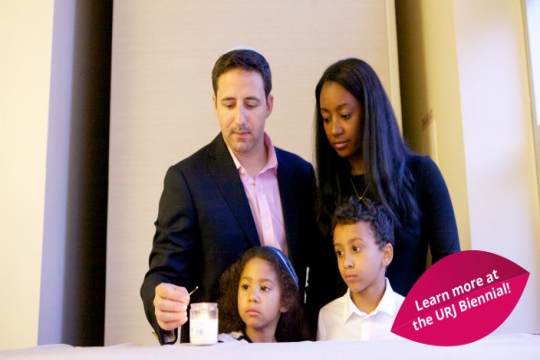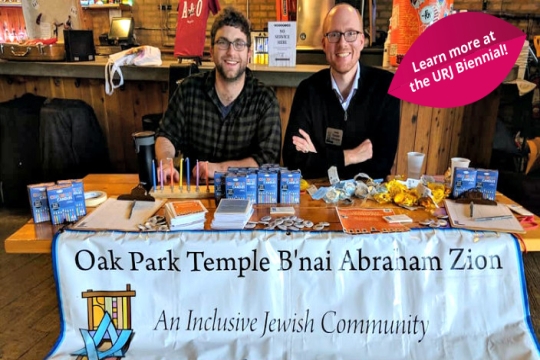
Congregations increasingly recognize and understand that it is personal relationships that keep members committed and engaged with the community. These relationships – with clergy, staff, and each other – promote a sense of belonging, value, and meaning, and ultimately, an investment in the overall strength and success of the community.
A number of Reform congregations recently received Belin Outreach and Membership Awards or honorable mentions from the URJ for their work to promote authentic, meaningful relationships among members. They are experimenting with various models (and, yes, programs!) that empower congregants to nurture relationships on their own and to connect with others in the larger congregational community.
These peer-to-peer program models encourage congregants to facilitate small-scale programs – sometimes even in their own homes.
- Temple Beth-El in Jersey City, N.J., created Hanukkah in the ‘Hood, at which members hosted other members, unaffiliated friends, and community members in their homes for festival candle lighting. In addition to positioning lay leaders as ritual and religious leaders in their own homes, the initiative promoted a sense of community beyond the synagogue walls.
- Shalom @ Home, a program of Temple Ohabei Shalom in Brookline, MA, invited every adult congregant to, during the course of a year, attend a small social gathering hosted by another member. Guest lists for each event were carefully compiled so that each congregant knew at least one other person attending and had an opportunity to meet others. The synagogue’s senior staff members facilitated meaningful discussions designed to help guests reflect on their relationship to the community, as well as expand and deepen their connections to others.
Staff-initiated program models developed in several congregations were particularly innovative in their content:
- Temple Beth Shalom in Needham, MA, launched Bumps, Babies, and Beyond to provide a context in which Jewish families with young children could forge key relationships within a synagogue environment. Offering classes for every developmental stage, beginning with parenting classes for first-time expecting couples and continuing for three years, the congregation offers free classes for a year to families that join the synagogue.
- Rabbi’s Coffee Klatch was born when Jews-by-choice at Congregation Oheb Sholom, in Reading, PA, expressed how much they missed the private learning sessions with the rabbi that had been part of their conversion process. Meeting as a group allowed members to form relationships with each other, strengthen their ties to the congregation, and feel supported by the rabbi in the years after their formal conversion.
- Drawing on the time-honored Texas tradition of football to bring people together, Adat Chaverim in Plano, TX, hosts Super Shabbat, a football-themed Shabbat. In addition to worship, the annual event includes team jerseys, a “tailgate” dinner, and a special oneg, complete with trivia and an amateur photo booth. Super Shabbat is now an important part of the community’s minhag (tradition), bringing together most of the Adat Chaverim families and inspiring a few new ones to join each year.
Creating opportunities for members and potential members to gather, meet, and engage with one another in meaningful ways is essential for synagogue success. Thoughtful and innovative initiatives that foster these relationships and connections are sure to enrich the congregations – and the individuals involved in the activities.
The URJ’s Belin Outreach and Membership Awards – funded through the generosity of David Belin, z”l – are presented to up to 16 congregations for initiatives that demonstrate the concept of audacious hospitality by actively welcoming and integrating those new to Judaism, creating relationship-based engagement models, or engaging and retaining members with innovative practices. This post is one in a series highlighting Belin Award-winning programs and the principles that guided their development.
To learn more about audacious hospitality strategies and tools, attend the Union for Reform Judaism’s Biennial 2015, from November 4-8 in Orlando, FL. With 5,000 attendees from around the world, the Biennial is the largest Jewish gathering in North America. Learn more and register at urj.org/biennial.
At the time this was published, Jessica Ingram was a member of the URJ’s Strengthening Congregations team, and the manager of Communities of Practices.
Related Posts

Meet This Year's Belin Award-Winning Congregations

How One Synagogue Honored Loved Ones Lost – and Found Community Anew
